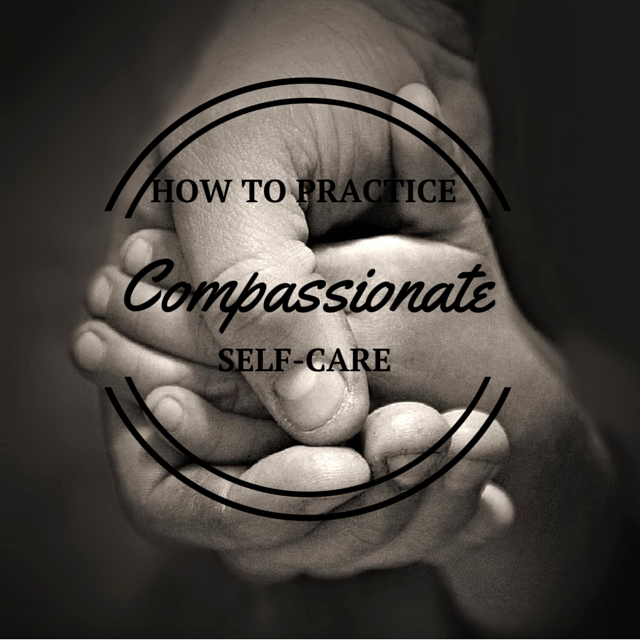In this busy world, with its unending demands on our time and energy, it’s easy to become depleted. If we want to avoid burnout, we must practice healthy self-care. In previous posts, I made the case for self-care, discussed why we don’t practice self-care, and talked about how healthy self-care involves both nurturing and limits. Now it’s time to talk about some practical how-to’s. This post will talk about the nurturing, compassionate part of healthy self-care, and next week’s post will wrap up this series on self-care by covering the disciplined, limit-setting part of healthy self-care.

1) Pay attention to your emotions
Emotions are like indicator lights on a car’s dashboard. When an indicator light comes on, we know there’s something under the hood that needs attention. We pop the hood and deal with the underlying problem. We don’t look at the indicator light itself as the problem, and just clip the wire to make the light turn off!
Similarly, when we feel an emotion, that’s letting us know that something inside our souls needs our attention. We shouldn’t just try to make frustration, disappointment or sadness go away without dealing with the underlying issue. Part of effective self-care is noticing our feelings.
Once I had a client, Melissa (not her real name), who couldn’t figure out why she kept feeling down. Life would be going well, and then she’d notice that she felt irritated and discouraged. She’d think, What’s going on? I was feeling fine yesterday. Then she’d ask herself when she started feeling bad and realize it often began when she spoke with her mom on the phone. Melissa realized it was a pattern: She’d feel lonely and call her mom, hoping that she’d get a sense of connection, but usually end up feeling disappointed, since her mom rarely showed interest in Melissa’s life. Once Melissa “popped the hood” and looked at the source of her negative feelings, she was able to grieve the absence of a close relationship with her mom and find other ways to meet her need for connection.
2) Develop a compassionate inner voice
A judgmental, critical inner voice whispers in our ear saying things like:
- You shouldn’t have done that.
- You suck at this.
- No one wants to be with you.
- You’re such an idiot!
Replace that voice with one that says things that a loving, compassionate parent would say to their child:
- Good job! You kept trying and you did it!
- You can try again next time.
- I understand why you might feel that way.
- You’re my child and you are important to me.
- I love you no matter what.
It takes effort to change our inner dialogue, but it’s crucial to practicing healthy self-care. We don’t take care of what we don’t value. Since God values us, we need to learn to value ourselves. Since God has compassion for us, we need to work at hearing his compassionate voice rather than our judgmental voice.
3) Notice your needs — and accept them
Sometimes the problem isn’t that I’m being judgmental, it’s that I get so busy and distracted that I don’t take the time to check in with myself and notice what I need. That’s a recipe for burnout.
Here’s a short list of things we might need that we don’t always notice:
- nourishment
- rest
- time alone or “down time”
- connection with a friend, encouragement
- time to focus on accomplishing a task
- laughter
- to feel loved and appreciated
- freedom to make our own decisions and mistakes
- time alone with God
If you want to increase your awareness of your needs, practice checking in with yourself. Access that compassionate inner voice, and ask your soul, How are you? What do you need?
Remember, your needs are not wrong. Maybe you need more down time than your spouse does; maybe you need more people time. Maybe you have physical limits that you need to respect. Your limits are not your enemy. Limits help us remember that we are not God.
4) Accept imperfection
God redeems. He brings good out of evil, strength out of weakness, joy out of pain. We live in a broken world, and we are broken people. But God can still create beauty in our lives.
So embrace imperfection! It is so easy for us to feel as though we just aren’t good enough. This is a real struggle for most mothers I know. We want so much to raise our kids well, and we get bombarded by messages telling us that we’re not doing enough. We compare our weaknesses to other moms’ strengths and criticize ourselves for not being a good enough hostess, for not being organized enough, for not being available enough.
I love what author Laurel Mellin says: “I don’t have to be perfect to be wonderful.”
I like to take that statement and run with it: I don’t have to be perfect to be loved. I don’t have to be perfect to be gifted. I don’t have to be perfect to be valuable. I don’t have to be perfect to be connected, to be content, to be joyful.
Parents who are able to embrace imperfection give their children a glimpse of God’s grace and redemption. When we let go of believing we aren’t enough, we learn self-acceptance and emotional resilience.
Question: What do you think? What helps you practice healthy self-care? You can leave a comment by clicking here.

Please note: I reserve the right to delete comments that are offensive or off-topic.